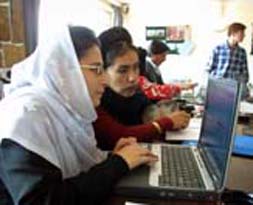The 1940s and 1950s saw increasing numbers of Afghan women employed as nurses, doctors and teachers. Afghan-Soviet relations had grown favorable during the early 1950s through increased trade agreeements between the two countries. Large sums of Soviet foreign aid and technical assistance initiated a modernizing effort within Afghanistan. By the late 1950s, women were increasingly encouraged to become economically active in order to help Afghanistan achieve its targeted development goals. Then Prime Minister Mohammad Daoud approached the issue of women’s emancipation cautiously, declaring veiling voluntary and curtailing marriage expenses.
These advancements for Afghan women were sustained throughout the 1970s and enforced by the People’s Democratic Party of Afghanistan after it obtained power in 1978. During this period, significant numbers of women were employed by universities, private corporations, and airline companies.
In fact, through the early 1990s, women were teachers, government workers and medical doctors. They worked as professors, lawyers, judges, journalists, writers and poets. However, this employment was almost entirely limited to urban areas, due to vehement opposition to the economic freedom of women among tribal and religious leaders in rural areas.
During Taliban rule between 1996 until 2001, women were strictly limited in their ability to work in public places. However, they were allowed to set up their own businesses from their homes, if they had the means to do so. They were also permitted to work in certain medical positions, but could only treat female patients. Women with children were not permitted to do any work. Widows were affected especially by restrictions on women’s employment and movement — although the Taliban issued an edict in 1999 allowing widows with no other means of support to take paid work, employment opportunities for these widows remained extremely limited.
International aid agencies, including UN bodies, provided work for some women during the Taliban era. However, in July 2000 the Taliban issued a decree banning all Afghan women from working in aid agencies except for those in the health-care sector. The Taliban did, however, allow HABITAT, a UN agency, to employ more than 3,000 women in pasta-processing centers in several urban areas. Additionally, the World Food Programme provided a small number of additional job opportunities through its bakery projects, employing about 300 women in Kabul and 100 women in Mazar-I-Sharif prior to September 2001.
Since the overthrow of the Taliban, women have sought to return to their former jobs as teachers, doctors, and civil servants. Radio and television broadcasts in Kabul have once again featured woman commentators.
In the years since the transitional government of Afghanistan has been in place, the Afghanistan Ministry of Health has prioritized the creation and implementation of reproductive health programs, especially the provision of emergency obstetric care and family-planning services. Midwives are being trained to provide basic reproductive health services at health posts and health centers, and obstetricians provide high-risk obstetric care, including cesarean births at district hospitals.
Some 10,000 women have been trained by the All Afghan Women’s Union, a training center for women entrepreneurs based in Kabul. According to Microfinance Times, 75 percent of all active microcredit borrowers in Afghanistan are now women, many of whom use their loans to start new businesses. Beauty parlors, tailoring shops, and bakeries are just some of the enterprises Afghan women now own. Many women actually earn enough to support themselves and their families independently. Jamila Allah Muhammed, a mother of six in Kabul, started a small bakery in her home using a microcredit loan from FINCA, a global microcredit agency working in Afghanistan. Her business is little more than a stove built into the ground, but with her business she now makes enough money selling bread to support her family.
Afghanistan’s first association of female judges, the Afghan Women Judges Association, aims to ensure the active participation of female judges and lawyers in the judicial system, as well as to promote quality and reliable legal advice for vulnerable Afghan women countrywide. There are currently some 50 female judges in Afghanistan, most of them working in Kabul.
However, women in Afghanistan’s professional world is still a revolution in the making. Culturally speaking, for many Afghans the idea of women owning businesses and working outside of their homes is still suspect. Furthermore, not all Afghan women who own and operate their own businesses yet control their profits, as this role is sometimes usurped by their husbands or other male family members. For other Afghan women, daring to begin a new business can still be a life-endangering act.
- Previous: Politics



